World Central Kitchen (WCK)

Credit: DFID - UK Department for International Development
Licence: Creative Commons Attribution 2.0 Generic
27 March 2019
| Giver: | - |
|---|---|
| Receiver: | Individual or unstructured/informal group |
| Gift: | Other |
| Approach: | Philanthropy |
| Issues: | 2. Zero Hunger, 3. Good Health and Well-Being |
| Included in: | Food and Generosity |
Introduction
World Central Kitchen (WCK) is a nonprofit dedicated to providing food and other relief services in areas impacted by natural disaster, war and other crises. Founded in 2012 by celebrity chef José Andrés, the organization cooks and distributes meals, builds sustainable, safe cooking spaces, organizes culinary classes and plants vegetable gardens.
At the heart of WCK’s vision is a commitment to honor the distinctive tastes and preferences of the regions where the organization works. In their field operations, WCK chefs collaborate closely with local residents, following their recipes and techniques to prepare meals that are both nutritious and emotionally satisfying. “You have to know what their comfort food is like,” Karla Hoyos, a chef who volunteered with WCK in Puerto Rico, told the BBC in 2023. “If you're gonna help, it's about them. It's not about you.”
Inspired by the Universal Language of Food
Born in Mieres, Asturia, Spain, in 1969, Andrés left home at the age of 15 to attend a culinary institute in Barcelona. After dropping out of school he met renowned chef Ferran Adrià, who hired him to work at his restaurant El Bulli in Spain’s Costa Brava region. In 1990 Andrés moved to Washington, D.C., where he opened the Spanish restaurant Jaleo. Andrés’s novel interpretation of his native cuisine helped popularize tapas in the US, building the prestige among both diners and critics that eventually enabled him to launch a global restaurant empire.
Early in his career Andrés also volunteered at DC Central Kitchen, a pioneering nonprofit that distributes meals and provides culinary employment training to marginalized groups. He found a mentor in the organization’s founder, Robert Egger, whose focus on the dignity of the individual profoundly influenced his own philosophy of giving.
Andrés first took meaningful philanthropic action providing food relief after the 2010 earthquake in Haiti. When some Haitian women taught him how to cook black beans in the local style, he realized that the most effective way to feed people recovering from trauma was to prepare familiar, “comfort” dishes they liked to eat.
Launching a Global Humanitarian Mission
With this lesson in mind, Andrés launched World Central Kitchen. In its first decade of operation, WCK conducted critical relief work in Puerto Rico, Houston, Ukraine and other regions. In March 2024, WCK spearheaded humanitarian food delivery to Gaza during its war with Israel – the first authorized maritime aid shipment to the territory in two decades. In less than a month, the relief effort established 68 community kitchens throughout the territory, through which they served more than 43 million meals to Palestinians in need.
Tragically, the organization’s Gaza mission suffered a devastating setback on April 1, 2024, when Israeli airstrikes accidentally targeted a convoy of relief vehicles, killing seven WCK volunteers. In the aftermath of the catastrophe, WCK suspended its operations in the region. In a New York Times opinion piece published days after the attack, Andrés implored the Israeli government to cease disrupting humanitarian aid efforts. “It is not a sign of weakness to feed strangers; it is a sign of strength,” Andrés wrote. “The people of Israel need to remember, at this darkest hour, what strength truly looks like.”
Despite this heartbreaking loss, WCK remained intent on continuing to feed the besieged Palestinians. In late April 2024, after holding a funeral for the seven fallen volunteers at Washington, D.C.’s National Cathedral, the organization resumed its relief work in Gaza. This courage in the face of life-threatening conditions – combined with a deep compassion for the people they serve – exemplifies the spirit of WCK’s charitable mission.
Contributor: Stephen Meyer
| Source type | Full citation | Link (DOI or URL) |
|---|---|---|
| Website |
Andrés, José. “After Hurricane Maria, Chef José Andrés Had A ‘Crazy Dream’ To Feed Puerto Rico.” Interview by Terry Gross. Fresh Air, NPR, September 10, 2018. Transcript. |
https://www.npr.org/transcripts/646242247 |
| Publication |
Chien-Chi, Chang. “How José Andrés’s World Central Kitchen Went to War.” Wall Street Journal, October 27, 2022. |
https://www.wsj.com/articles/humanitarian-innovator-2022-world-central-kitchen-jose-andres-ukraine-11666732556 |
| Publication |
Hendrix, Steve. “Jose Andres thinks food can fix the world, starting in Haiti.” Washington Post, June 6, 2014. |
https://www.washingtonpost.com/lifestyle/magazine/jose-andres-thinks-food-can-fix-the-world-starting-in-haiti/2014/06/05/8e4de760-d0cb-11e3-9e25-188ebe1fa93b_story.html |
| Website |
Perez, Sofia. “José Andrés: The Man Who Created an Army of Culinary First Responders.” BBC, September 11, 2023. |
https://www.bbc.com/travel/article/20230911-jos-andrs-the-man-who-created-an-army-of-culinary-first-responders |
| Publication |
Sella, Adam. “How an Aid Group Built a Jetty to Get Food into Gaza.” New York Times, March 25, 2024. |
https://www.nytimes.com/2024/03/25/world/middleeast/gaza-aid-ship-jetty.html |
| Publication |
Andrés, José. “José Andrés: Food Has the Power to Change the World.” Time, October 21, 2015. |
https://time.com/collection-post/4080585/jose-andres-food-haiti/ |
| Publication |
Andrés, José. “Let People Eat.” New York Times, April 3, 2024. |
https://www.nytimes.com/2024/04/03/opinion/jose-andres-let-people-eat.html |